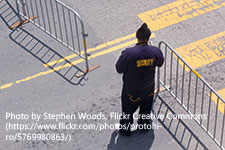

The sight of guards at estates, shopping malls, businesses and basically everywhere is no surprise. Guards have become a way of life in a country where politicians see the crime rate as a number to be manipulated rather than a social issue to be addressed.
While security companies most often provide services to a variety of clients in a variety of industries, there are certain markets that require specific skills and services that are apart from the norm. Residential estates are one of these. Larger estates require more than a body at a gate or someone strolling around the perimeter every hour, they need guards who are security officers and gate ambassadors, and who are able to efficiently deal with residents and their eccentricities, as well as technology.
While the guarding industry has changed over the years, our round table report in this issue shows that it has perhaps changed the most in the estate security market. In addition to the round table, Hi-Tech Security Solutions asked two companies unable to make it to the event to give us their input on the guarding industry as it pertains to estates.
Gary Tintinger marketing and business development director at Enforce Security Services, says the fact that different skills are required by estates should not be a surprise. “The security requirements of every site is different, so the roles of security guards will always differ. Although requirements are generally industry specific, they are also client-specific and so individual sites will have their own sets of processes and security challenges and requirements. Sites will also require guards with specific temperaments and personality characteristics, depending on their specific needs and requirements.”
Estates are no different in this respect. The roles performed by security guards on estates will differ from those in shopping centres, but so too will they differ from estate to estate. Although estate security operations may be similar in terms of technology used and operational processes, the roles of guards on retirement estates, for example, will differ from those posted on lifestyle estates.
And as mentioned above, their personalities and temperaments will also differ. “For example, a security guard at a retirement estate will need to interact with retired people, so will have to be more patient, willing to assist residents in need, and also, perhaps, eager to engage in conversation,” says Tintinger. “Their demeanour will be softer, although they will need to be just as skilled and equipped to handle security threats and technology. A guard posted at a lifestyle estate, however, may have to be firmer in his approach to residents, especially if dealing with trouble-makers, arrogant residents, and teenagers or juvenile delinquents.”
Brett Fisher, CEO of RSS Security Services goes further, noting that guards on estates are dealing with far more personal situations when it comes to looking after homes where families live, instead of a business where people typically work from 8 am to 5 pm.
“Looking after people’s husbands, wives and children needs a really strong calibre guard who can understand the personal needs of each household. That is not to say either job specification is less important than the other.”

Specific training required?
While the temperaments may be different depending on where a guard is, both Tintinger and Fisher agree that the training PSiRA stipulates should only be seen as a starting point. Effective security personnel require more than the basics if they are to deliver as required on estates (and elsewhere).
For example, Fisher says that, depending on the level and responsibility of the guard, they would require technical knowledge and be trained up on various access control systems.
Some estates have their own control rooms therefore you would need experienced control room operators to operate the software where signals for alarms or panics etc. are received. Some estates have invested heavily in IP camera systems run by software using analytics. They would require training on the software used and also what to look out for and when to dispatch an armed reaction officer.
“Some guards would need management training courses and should they be equipped with a firearm, as well as all the necessary compliancy and training that go with that job specification,” Fisher adds.
Tintinger adds that apart from PSiRA training, basic requirements for any guard also include physical fitness, vision, good health and they will also need a clear criminal record. Added to this, training needs to be a norm for guards, occurring before deployment, on-the-job and after-deployment.
He adds, “aside from training, it is important that guards possess good 'public relations' skills and are able to interact with people – from clients and their customers, to residents and fellow security personnel. They also need to be able to speak to and deal with people in the right manner, especially in cases where they need to resolve conflicts, and or handle themselves when faced with difficult or challenging people. Certain aspects of this can be learned, but often it boils down to guards having the right temperaments.”
Vanilla or with extras?
It’s not all about guarding, however. The performance of a guard can only really be measured over the long term when compared with expectations found in the processes the estate requires and assigns the service provider to perform. This means the estate needs to know what its risks are and what it wants a security service to do in mitigation of them.
When hiring a security company, one often finds the estate personnel in the body corporate or Homeowners’ Association (HOA) rely on their service provider to tell them what to do. And while security service providers have standard operating procedures (SOPs) for estates, these are really the basic, vanilla processes that can be applied to any estate.
Fisher notes that these should be seen as a starting point and in cooperation with the HOA determine what additional functions the guards should perform. “Some estates may still be half residential and half in construction phase, for example, which means many contractors would be in and out the estate. Once again, different rules need to be set down for contractor’s vs. visitor’s vs. residents.”
Tintinger agrees. “Ultimately the estate security manager is responsible for implementing the manpower SOP, but he/she would usually do this in conjunction with the security service provider. This is because the estate manager is knowledgeable on all matters pertaining to the estate – such as the residents, the type of estate, the expected security levels and the quality of life of residents – while the security service provider is the professional when it comes to the actual security strategy.
“By working together both parties can then devise a thorough and effective security plan while still keeping with the ‘feel’ of the estate and the quality of life residents are accustomed to, and expect.”
One of the additional skills estate security personnel will need is the knowhow to handle a variety of technical tools designed to make their jobs easier. Unfortunately, South Africa’s education standards leave a lot to be desired and it is not uncommon to see computer illiterate people applying for a position as a security guard.
Training essential
To overcome this, Fisher says a training manager must be assigned to the estate and commit to weekly training to bring all the guards up to speed. “Technology is part of the future and we need to upskill all our staff to be able to embrace the changes and the technology that is now at our finger tips. A company must invest in its staff and its staff will in turn look after its customers.”
Tintinger notes that the security industry is becoming increasingly technology-driven, so there is also going to be a big change in the calibre of security guards that will be sought after. “We have predicted for a while now that the increase in technology used in the guarding industry will impact heavily on manpower and that guards will, in future, have to enter the industry already technologically adept, or at the very least, computer literate.”
He adds that Enforce, which provides both manned security and security technology, is able to provide appropriately-trained staff. “Convergent security is the integration of new technology and physical manpower, and is an approach that we, as Enforce, are renowned for. The converged security strategy is also one where there is no absence of a traditional guard, regardless of the sophistication of the technology. This is because technology has the ability to reveal information such as security breaches and live footage, but a physical guard still needs to interpret what the technology is revealing, evaluate the threat level, and then decide on the course of action.”
There can be no doubt that the role of the guard is changing, or perhaps we should say, has changed and will continue to change. However, having a human on site to make decisions and interact with residents is something technology will not be able to accomplish any time soon and so we still need humans to ensure estates and their residents are secure.
The functions guards on estates have to include in their repertoire has and will change, requiring constant training and updating of their skills, especially where it comes to technology. While many see technology as a threat to the jobs guards can perform, the reality is technology improves their performance if used correctly.
The result therefore of better trained guards and improved technology is safer estates and residents. The caveat here, however, is that if you choose the cheapest solution, the service provider you select probably doesn’t have the money to invest in proper training, leaving you with a cheap solution that gets you kudos from the trustees, but all you are really paying for is a good feeling because you are paying for watered-down security and expecting miracles will simply happen.
Services on offer
Gary Tintinger marketing and business development director at Enforce Security Services, says his company provides a converged security solution to residential estates and communities. “As we are among the leaders in security technology, we are always on the cutting edge of new technology and employ the latest, most effective equipment at our residential estate sites, and others. We also provide the appropriately trained manpower to operate the technology.”
Brett Fisher, CEO of RSS Security Services says RSS provides guarding, access control systems, offsite monitoring CCTV systems, electric fence maintenance teams, reaction officers, controllers, dog handlers, training teams and dedicated management services.
For more information contact:
Enforce Security Services: www.enforce.co.za
RSS Security Services: www.rsssecurity.net
| Tel: | +27 31 573 7600 |
| Fax: | +27 31 579 3040 |
| Email: | info@excellerate.co.za |
| www: | www.excellerate.co.za |
| Articles: | More information and articles about Excellerate Services |
© Technews Publishing (Pty) Ltd. | All Rights Reserved.